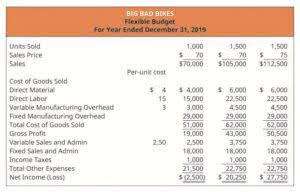
Because of its adaptability and scalability, Xero is a desirable alternative for firms of Interior Design Bookkeeping all sizes. Maintaining compliance with healthcare regulations is a vital part of medical practice bookkeeping. Adhere strictly to insurance billing and reimbursement protocols to maximize revenue and avoid penalties. In your medical practice, ensure HIPAA compliance is observed when handling patient payment information, especially if sharing data with third parties.
- While this is less expensive than hiring a CPA firm, it often costs more in the long term.
- Our detailed brochure provides insights into how Remote Books Online can help you maintain accurate bookkeeping, stay tax-ready, and make informed financial decisions.
- Effective financial management in healthcare accounting requires a multifaceted approach to handle the unique challenges faced by medical organizations.
- For businesses operating in the medical industry—whether as a private professional practice or another type of firm—there are some unique bookkeeping issues that must be addressed.
- Additionally, many outsourcing firms offer scalable solutions, allowing you to adjust the level of service based on your practice’s needs.
- Maintaining compliance with healthcare regulations is a vital part of medical practice bookkeeping.
What is the future outlook for healthcare accounting?
When choosing an electronic medical record system, you should look for one that can easily integrate with your accounting software. Your EMR is an essential data source for your clinic, and you should take advantage of it to gather revenue and billing data. Adopting automation in your bookkeeping practices can significantly enhance productivity and efficiency, payroll leading to a more streamlined financial operation. For efficient Bookkeeping for Medical Practices, you must update your financial records frequently—ideally daily or weekly. This habit ensures you have current financial insights and can spot discrepancies early.
My Count Solutions
This meticulous approach not only provides a clear audit trail but also helps in generating precise financial reports. Detailed records support better decision-making, enabling you to identify financial trends, manage cash flow effectively, and plan for future expenses with greater accuracy. Bookkeeping is often seen as the ordinary side of running a medical practice, overshadowed by the more trendy aspects of patient care and medical advancements. However, the importance of bookkeeping for doctors and medical practices cannot be large. It serves as the backbone of financial management in the healthcare sector, offering a wide range of benefits that directly impact the success and sustainability of medical practices.
Bookkeeping for Medical Practices: 5 Tips for Success

Going paperless is a great choice, not only for the environment but for your medical practice as well. It can save you a significant amount of money on the cost of paper and ink. Neglecting to reconcile accounts regularly can lead to undetected errors, such as missing payments or accounting discrepancies. Research shows that happy patients are more likely to stay and get better care.

Organize Financial Documentation

When things run smoothly, patients get their bills on time and with fewer mistakes. This can send invoices faster, cut down on late payments, and help your practice grow. This process involves matching transactions recorded in your records to the information on your bank or credit card statement. If you see a charge for cotton swabs, for example, that you don’t recognize, or a payment for an outpatient procedure you didn’t expect, you can investigate and ensure it’s legitimate. Here are some best practices for setting up your business accounting and maintaining profitability. When you went to medical school, accounting probably wasn’t part of the curriculum.
Long-term benefits of bookkeeping for medical practices
- Bookkeeping is fundamental to the financial health and profitability of your practice.
- For instance, the intricacies of medical billing codes and insurance claims are crucial elements that distinguish medical bookkeeping from other types.
- Conducting regular financial audits to ensure accuracy and compliance is fundamental in medical accounting.
- This integration enhances the efficiency and accuracy of financial operations.
- Emergencies, new treatments, and technological advancements can lead to sudden and significant costs.
Too often, doctors and dentists use their practice as a personal checkbook, running car leases, family vacations and other personal expenses through the practice. Get free guides, articles, tools and calculators to help you navigate the financial side of your business with ease. Practices planning to expand or transition into a larger entity may choose accrual accounting as it aligns better with more complex business structures. Accrual accounting can be more resource-intensive, often requiring experienced accounting staff or external accounting services.
- Being transparent not only makes it easier to identify areas of financial strength and weakness, but it additionally serves as the foundation for a solid financial strategy.
- The income statement, balance sheet, and cash flow statement are essential financial statements generated from the maintained books.
- Adhere strictly to insurance billing and reimbursement protocols to maximize revenue and avoid penalties.
- The need for transparency and accuracy in financial reporting is paramount to build trust with stakeholders.
- Larger practices or those with more complex financial transactions might benefit from accrual basis accounting for a more accurate representation of their financial position.
- This scenario highlights the importance of efficient revenue cycle management and the need for robust systems to track and expedite payments.
In the realm of medical practice bookkeeping, precise inventory monitoring is bookkeeping for medical practices critical. Keep a close eye on essential items such as medical supplies, instruments, vaccines, and medications, setting re-order points to prevent shortages that could affect patient care. Use your bookkeeping system to create and track purchase orders, ensuring seamless integration and management.
- It helps with compliance, improves cash flow, and supports smart decisions for your practice’s future.
- Tax compliance and payroll management are also made easier with QuickBooks.
- Cost savings from automated scheduling and electronic billing can be significant, but providers must determine which option will yield the most returns.
- Staying updated on these changes will ensure that your bookkeeping practices remain compliant and accurate.
- Running a successful medical practice requires meticulous attention to both clinical and financial details.
- Penalties, audits, and legal consequences may follow from incorrectly reporting income, failing to keep records of deductions, or failing to file taxes by the due date.
It also involves identifying financial risks and implementing strategies to mitigate them. Partnering with bookkeeping specialists like Uplinq can further optimize your systems and provide the ongoing strategic guidance that prosperous practices rely on. With diligent bookkeeping and financial mastery, your medical business will have the foundation needed to flourish. Bookkeeping relies on the double-entry accounting method, which requires recording every transaction in at least two accounts. For instance, recording a bill payment would require debiting the expense account and crediting the cash account. We thoroughly research and test the apps we include in our regular workflow for Client bookkeeping services.
Conduct Regular Financial Reviews
Medical practices must balance immediate financial needs with long-term investments, such as technology upgrades and staff development, while also preparing for unforeseen expenses. Navigating the complex billing and coding landscape requires extensive knowledge and attention to detail. Medical practices must constantly train their staff to keep up with the latest coding updates and revisions. Additionally, coding inaccuracies can lead to underbilling or overbilling, both of which have significant financial and legal implications. Larger practices or those with more complex financial transactions might benefit from accrual basis accounting for a more accurate representation of their financial position. Conducting regular financial audits to ensure accuracy and compliance is fundamental in medical accounting.
